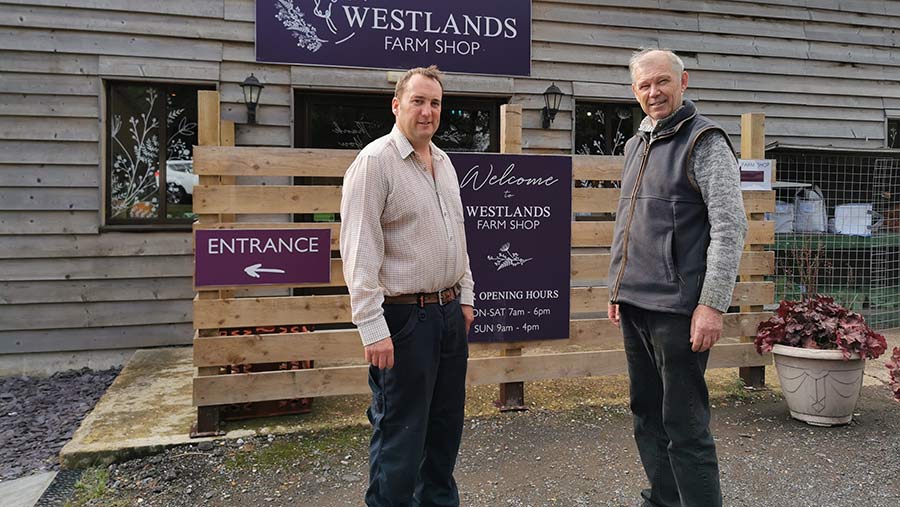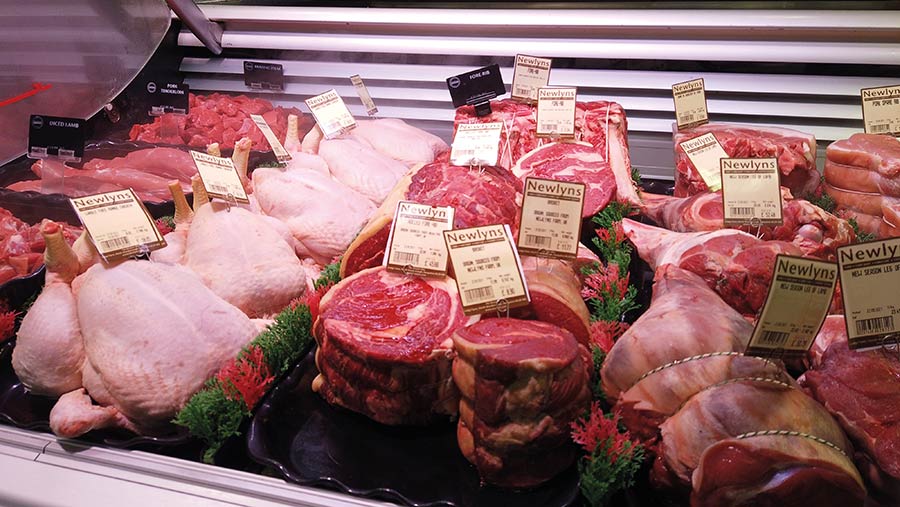Video: How local farm shops are filling the supermarket supply gap
 Graham Collett (left) and his father Stephen have invested heavily in their revamped shop © MAG/Philip Case
Graham Collett (left) and his father Stephen have invested heavily in their revamped shop © MAG/Philip Case Farm shops have always played a crucial role within rural communities, offering fresher, better-quality produce to support local farmers while reducing food miles.
Since the first Covid-19 lockdown in March 2020, these rural retail hubs have enjoyed burgeoning sales, serving the needs of local people throughout the pandemic and providing a lifeline in the supply of food and essentials.
There are well over 1,000 farm shops operating in the UK, according to the Farm Retail Association (FRA), which champions the country’s best farm shops and farmers’ markets.
See also: So you want to… sell produce at a farmers market?
Farm shops have an estimated combined turnover of more than £1.5bn, including sales from farm shop cafés.
But their resurgence during the pandemic hasn’t been easy.
Many businesses have worked around the clock and have had to adapt their services to meet demand, such as offering Covid-safe environments, express checkouts, click and collect, and home deliveries.
Graham and Kayleigh Collett are second-generation farmer-owners of Westlands Farm Shop, near Wickham, Hampshire.
They run the business in partnership with Graham’s parents, Stephen and Olwen Collett.
More customers
The family were forced to close the tea room under lockdown restrictions.
But with unprecedented demand for locally sourced food and a 35% increase in footfall, they decided to invest £60,000 into their business to regenerate the farm shop.
Local designers were hired for the redesign, which included new logos. The farmers expanded the fresh fruit and veg range and also launched a fresh milk vending machine.
Westlands teamed up with a local dairy farm, Meon Valley Milk, to install the pasteurised, whole milk self-service machine, which reduces customer waste through reusable glass bottles.
Mr Collett said: “We basically had a blank canvas as without a tea room and a kitchen, we got a third of the building floor space back.
“We also decided to put in a new Covid-secure entrance and exit and introduce a one-way system for customers.”
The farm shop has become a hub for local food producers, and it now sells nearly 3,000 product lines, including cheeses, yoghurts, meats, potatoes, local beers and wines, frozen vegetables, honey, jams and chutneys, and turkeys at Christmas.
Since the coronavirus, the farmers say more customers are visiting the shop to buy their staple foods, rather than just buying meat.
Mr Collett said gaps on supermarket shelves, the haulier shortage and people wanting to support local producers and shorter supply chains were driving sales.
Global uncertainty
Asked if he believes the uplift for farm shops will continue post Covid, Mr Collett said: “There’s so much uncertainty in the world, I’d have to say yes.
“We’re going to be here trading and open for business when others will be disrupted, because we can control our supply chains.”
Covid had highlighted the vulnerability of supermarket supply chains, he added.
“The supermarkets work on a just-in-time system and the shortage of HGV drivers meant our local Sainsbury’s recently had no fruit and veg,” said Mr Collett.
“Covid showed their shortcomings, whereas we’ve got very short supply lines because we deal direct with farms and growers.”
To try to ensure the business continues to thrive, Westlands has hired a PR company to improve its social media reach on Facebook, Twitter and Tik-Tok.
Marketing analysis to find new products, changes to in-store displays and regular customer service training for staff members are also considered crucial to the future success of the business.
Sound knowledge of business numbers, however, underpins everything. “You need to know each individual product, its margin. Is it helping you, or dragging you back?” said Mr Collett.
Newlyns Farm Shop
Further north in Hook, Hampshire, the Janaway family runs the award-winning Newlyns Farm Shop. They too have had to adapt their business to life under coronavirus.
Abby Janaway, a partner in the business, said that at the start of the first lockdown in March 2020, they closed the farm shop, café and cookery school, but then reopened as a call and collect service.
They installed eight new phone lines and a team of staff were able to take delivery orders over the phone.
The shop was turned into a warehouse, but the butchers were kept on to prepare the ready meals, deli and meat.
A team on the shop floor processes the orders. The food then goes into a chiller van for collection within the hour, via a non-contact drop into the back of the customer’s car.

The butchery counter at Newlyns Farm Shop © MAG/Philip Case
Mrs Janaway said the business had managed to attract many new customers from this service.
Newlyns started a free home delivery service for up to 20 customers a day, for vulnerable customers located within seven miles of the shop.
Before Covid, the average customer spend for a single transaction was £30, but this had increased to £70 during lockdown.
Following significant investment in Covid-safe measures, including screens at tills, sanitation and a one-way system, the shop reopened in July.
The average customer spend has fallen to about £40 now, but that is still a significant increase.
The Janaways are not standing still, and plan to begin work on an extension next spring, to enlarge the butchery area and kitchen.
“We’re seeing more demand. We want to keep moving the business forward with what customers want,” said Mrs Janaway.
‘Stars aligned’
In Yorkshire, Copley’s Farm Shop in Pontefract enjoyed a 117% year-on-year increase in sales in 2020.
During lockdown, the Copleys made alterations to their business, including the closure of the café and the opening of a drive-through shop, a burger van, food box orders delivered to the door, and stronger ties with suppliers.
They have invested £100,000 in a new deli and the café has been reopened with an extended seating area and the introduction of an electronic payment system.
“We have worked every hour that God sends. But the stars were aligned for the farm retail industry,” said owner Heather Copley, who runs the business with her husband Rob.
“Hopefully, other farm shop businesses will also have reinvested that influx of money so that they can keep customers coming back.”
Research to discover true value of farm shops
Research which aims to discover the true value to the nation of Britain’s farm shops has been launched by the Farm Retail Association (FRA) and Harper Adams University.
The project will seek to understand the impact farm shops have had, not only with their local communities, farmers and suppliers, but also upon the wider economy and the UK’s rural landscape. The survey results will be released next spring.
FRA chairman Rob Copley is encouraging all farm retailers to take part in this nationwide survey to give a clear picture of what the sector is worth to the economy and reflect the vital role farm retailers play in communities. For more details, visit farmretail.co.uk.
Community hub
In March 2020, Castle Farm, in Bishton, near Newport, was turned into a community hub two days into the first lockdown.
The family farm began selling fruit and veg, using contactless collection and deliveries to four local postcode areas.
Castle Farm Shop was opened In September and now sells more than 500 products from local suppliers, which are also available on the website.
Co-owner Jen Bradford said 1,500 customers were now on the company’s database.
“Many people want to shop more locally now and would rather come to an independent farm shop than their supermarket,” she said.
Following its success, the farmers plan to open a second farm shop at the Kingsway Shopping Centre in Newport this month.
Dr John Lever, Reader in Sustainable and Resilient Communities at the University of Huddersfield, said: “Farms shops are often unfairly criticised as being too expensive for the general public.
“But as the pandemic has shown, they can adapt quickly and provide a wide range of important community services when the need arises.
“As we look for ways to enhance regional economic recovery going forward, they deserve more support and recognition at the national level.”
Top tips to ensure a successful farm shop
Edward Berry runs The Flying Fork, a food and retail advisory service for farm shops, independent food retailers, delis and food producers.
He said farm shops had come to the rescue of British consumers during the lockdown by providing a reliable, well-stocked supply of excellent, locally sourced food.
Many people had also discovered farm shops were not as expensive as they imagined, and enjoyed the shopping experience, he added. “The challenge now is holding on to these new customers as supermarkets fight back with price deals.”
Here are his top tips for a successful farm shop:
- Locality – the food is sourced from the local area and food miles are low.
- Knowledge – the ability to talk about the produce, where it comes from, how it was sourced, how to prepare it, and so on.
- Customer service/messaging – Make customers feel welcome. Giving them that “big warm hug” is essential.
- Passion – As the farm shop business grows, the workforces does too. Staff must share the farmer’s passion for food and drink.
- Discovery – Having good links with suppliers is key to keeping things fresh and innovative.
- Orientation – Ease of finding your way around starts from the moment you arrive in the car park.
